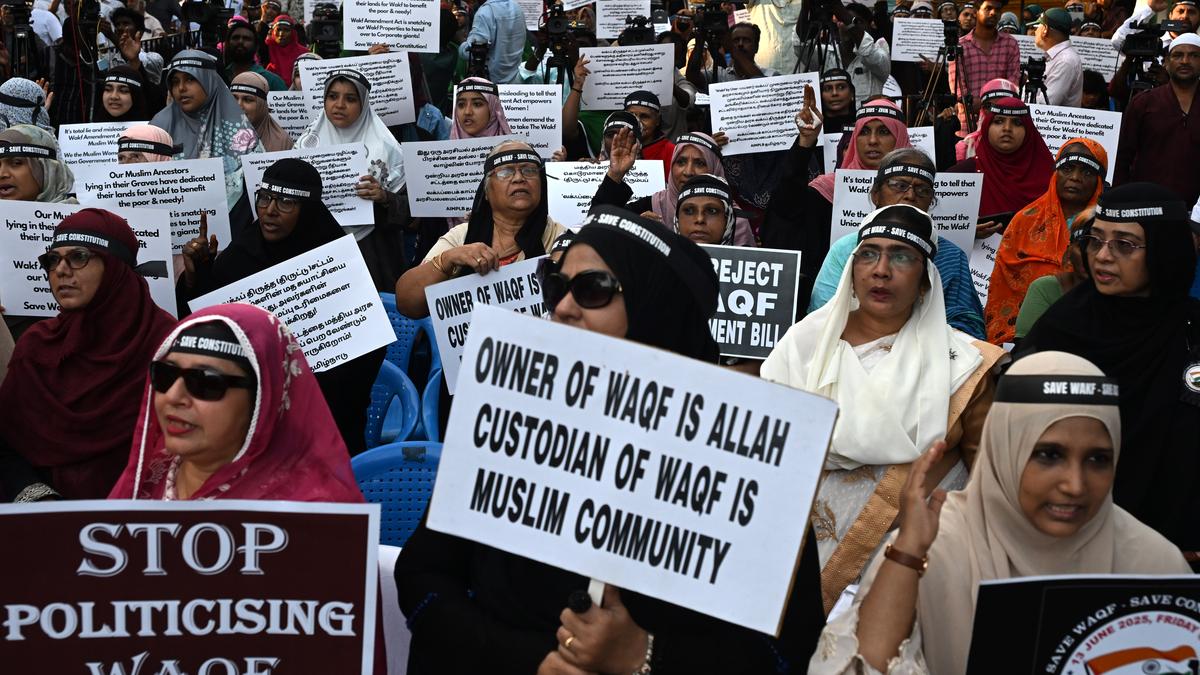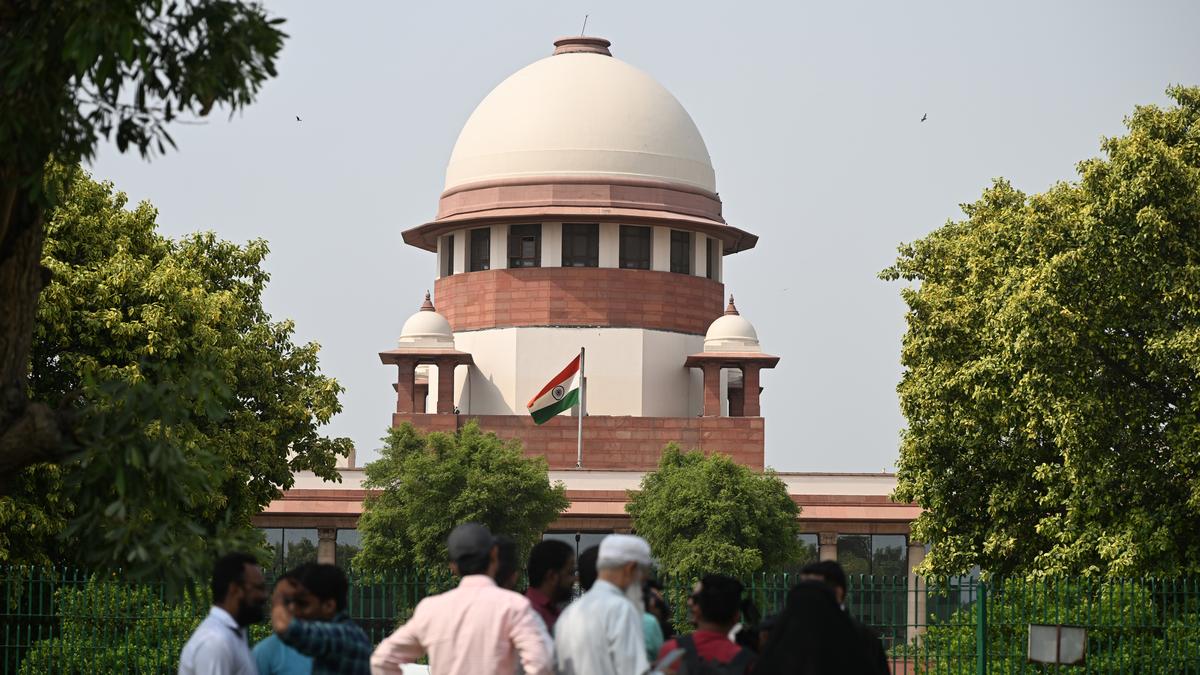-
September 15, 2025 11:32‘We expect that whenever the final decision comes, we will be given 100% relief:’ AIMPLB member
Eidgah Imam & AIMPLB member Maulana Khalid Rasheed Farangi Mahali: The stay on Sections 3 and 4 is a very welcome step, and we expect that whenever the final decision comes, we will be given 100% relief.
-ANI
-
September 15, 2025 11:19All India Muslim Personal Law Board member satisfied with the verdict
Syed Qasim Rasool Ilyas, Member of All India Muslim Personal Law Board, tells ANI that he is satisfied with the verdict.
-
September 15, 2025 11:17Good decision: Congress MP Imran Pratapgarhi
Congress MP Imran Pratapgarhi welcomes the Supreme Court judgment. He had moved the top court against the Waqf Board amendments.
-
September 15, 2025 11:04Crucial sections in amendment law stayed
The Supreme Court does not stay the Waqf (Amendment) Act in its entirety, saying that the presumption is always in favour of the constitutionality of a statute.
However, certain crucial sections in the amendment law of 2025 have been stayed.
-
September 15, 2025 11:02Court does not intervene in waqfs-by-user
The court did not intervene in the case of waqfs by user as it noted that the registration of waqfs has been going on since the 1995 enactment through the 2013 enactment.
-
September 15, 2025 11:01Waqf bodies should have majority Muslim members
The court makes it clear that waqf bodies should have a majority of Muslim members. Waqf Boards and Waqf Council may have up to three/four non-Muslim members. The Chief Executive Officer should be ideally a Muslim, it said.
-
September 15, 2025 11:00Executive cannot be given sweeping authority that would affect rights of citizens
The Bench of the Chief Justice of India B.R. Gavai and A.G. Masih stayed Proviso 2 of Section 3C which mandates a disputed property would not be treated as waqf unless the executive permits it after an enquiry.
The court holds that an Executive, through the office of the District Collector, cannot be given sweeping authority which would affect the rights of citizens.
-
September 15, 2025 10:55‘Case was not made to stay entire provisions of Act’
“We have considered the prima facie challenge to the sections — the case was not made to stay entire provisions of the Act,” said the Bench.
The court has stayed the provision that requires a person to prove he was professing Islam for five years before creating a waqf.
It said that prima facie, this would be an arbitrary exercise of power.
-Krishnadas Rajagopal
-
September 15, 2025 10:50Only certain provisions were directly challenged: Bench
“Presumption is always in favour of the statute. The grant of stay is only in the rarest of rare category. Though the entire Act was presumed to be challenged, only certain provisions were directly challenged,” said the Bench.
-Krishnadas Rajagopal
-
September 15, 2025 10:19Waqf Act 2025 is a ‘creeping acquisition’ of waqf assets, petitioners tell SC, countering presumption of constitutionality
Countering the Supreme Court’s observation that a parliamentary statute like the Waqf (Amendment) Act, 2025 enjoys a presumption of constitutionality, petitioners on Tuesday termed the new law a “creeping acquisition” of waqf properties owned by the Muslim community, the largest religious minority group in India.
A Bench of Chief Justice of India B.R. Gavai and Augustine George Masih heard petitioners for a full day on their plea for an interim order to stay the implementation of the 2025 Act, which came into force on April 8.
Read the story here
Waqf Act 2025 is a ‘creeping acquisition’ of waqf assets, petitioners tell SC, countering presumption of constitutionality
Supreme Court hears petitioners challenging Waqf (Amendment) Act, 2025 as unconstitutional, sparking debate on minority rights in India.
-
September 15, 2025 09:55Waqf Amendment Act was passed without political ethics or moral fear, says VCK chief
VCK founder Thol. Thirumavalavan on Friday said the Waqf Amendment Act was passed in Parliament without “political ethics or moral fear” by the BJP despite severe pushback from the Opposition ranks at every forum.
Addressing a meeting organised by the All India Muslim Personal Law Board demanding the repeal of the amended legislation, Mr. Thirumavalavan alleged that the BJP had used the power of the government to target the Islamic community in the name of law and democracy over the last 11 years.
Read the story here
-
September 15, 2025 09:23New law breaches SC’s own pronouncement that ‘once a waqf, always a waqf’
Petitions in the Supreme Court primarily argue that the new law, Waqf (Amendment) Act, 2025 violates the court’s own pronouncement of “once a Waqf, always a Waqf” to deprive the Muslim community of age-old tracts of Waqf lands and facilitate their conversion to private or government property.
Pleas by organisations like the Samastha Kerala Jamaithul Ulema, represented by advocate Zulfiker Ali, point out that at the heart of the controversial law is an attempt to stamp control over huge tracts of Waqf property, spread across the country, which have belonged to the minority community for centuries.
Read the story here
New law breaches Supreme Court’s own pronouncement that ‘once a waqf, always a waqf’
Supreme Court petitions argue new Waqf law violates religious and property rights, endangering Muslim community’s age-old lands.
-
September 15, 2025 08:40The Waqf (Amendment) Act, 2025, should be viewed as a legal aspect and not from a religious point of view, say experts
The UMEED Act, or the Waqf (Amendment) Act, 2025, should be viewed legally and not with the angle of religion, said Divya Prasad, an advocate practicising at the Andhra Pradesh High Court.
Speaking at a seminar on the subject recently, she agreed that there are many pitfalls and challenges in the Act and these provisions need to be reworked. Ms. Divya pointed out that main bone of contention of the ‘Registration of the land’ was already mentioned in the Mussalman Waqf Validating Act of 1913 and later in the 1954 Waqf Act and also in the later amendments. So the new amendment having these aspects is not new. “Moreover, the Act encapsulates what the Sachar Committee had intended to do,” she said.
Read the story here
-
September 15, 2025 08:12Creation of waqfs is not an essential religious practice of Islam: Centre
The Centre on Wednesday (May 21, 2025) sought to dismantle petitioners’ argument in the Supreme Court that creating ‘waqf’ is an essential religious practice in Islam, saying charity is not an essential part of any religion.
“waqf, by its very nature, is charity, and any charity, either under Islamic law or Hindu law or Christian law, has never been considered to be an essential religious practice. Charity is a part of every religion, but not an essential religious practice of any religion. A Muslim who does not create a waqf would not be less Muslim or cease to be a Muslim,” the Centre submitted before a Bench headed by Chief Justice of India B.R. Gavai.
Read the story here
Creation of waqfs is not an essential religious practice of Islam: Centre
Centre defends Waqf law in Supreme Court, stating charity is not an essential religious practice in Islam.
-
September 15, 2025 07:45Supreme Court indicates mandatory registration of waqfs began in 1923, not in 2025
The Supreme Court on Thursday (May 22, 2025) said a requirement to mandatorily register waqfs dated back to 1923, and did not start with the Waqf (Amendment) Act of 2025.
Chief Justice of India B.R. Gavai, heading a Bench comprising Justice A.G. Masih, asked why waqfs across the country, including waqfs by user, had not bothered to register themselves all these years.
Read the story here
-
September 15, 2025 07:30Supreme Court to pronounce verdict on stay of Waqf (Amendment) Act 2025
The Supreme Court is scheduled on Monday (September 15, 2025) to pronounce judgment on a plea to stay the implementation of the Waqf (Amendment) Act, 2025, which over a 100 petitioners described as a “creeping acquisition” of Muslim properties while the government defended as a necessary counter to “rampant encroachment” on public and private properties.
A Bench headed by Chief Justice of India B.R. Gavai had heard the case back-to-back for three days in May, the very same month he took over as top judge. The hearing was wrapped up on May 22 and the case reserved for judgment.
The case had reached the Supreme Court in early April, hours after the Waqf (Amendment) Bill of 2025 was cleared by the Parliament.
Read the story here
Supreme Court to pronounce verdict on stay of Waqf (Amendment) Act 2025 on September 15
Supreme Court to decide on Waqf Amendment Act, 2025, amid debate on Muslim property rights and government regulation.
Published – September 15, 2025 07:27 am IST



Email
SEE ALL
Remove